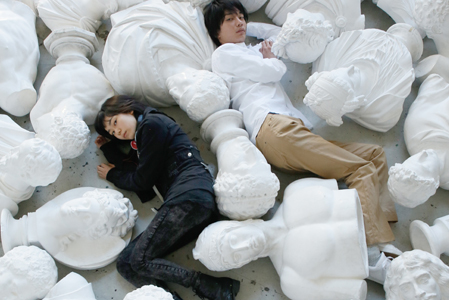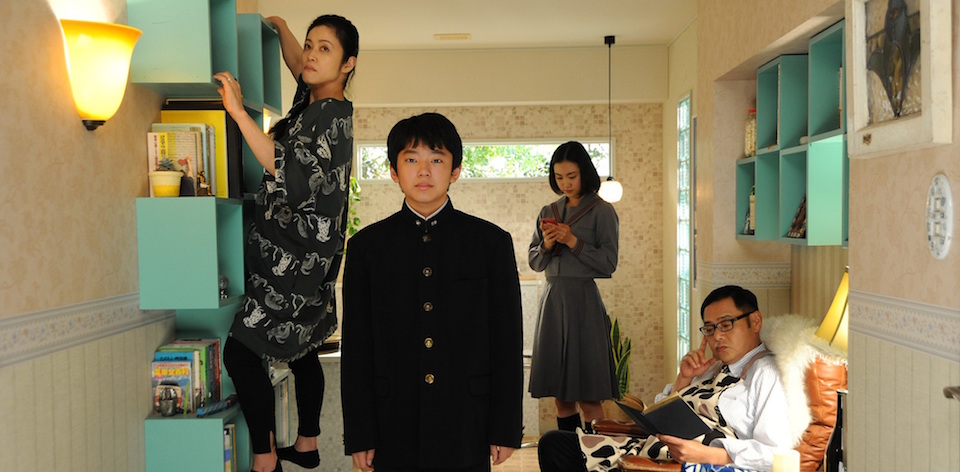The New Directions in Japanese Cinema (NDJC) program, an initiative of the Visual Industry Promotion Organization (VIPO), has been running since 2007. Designed to cultivate new voices in Japanese filmmaking, each of the films are 30-minute narrative shorts and shot on 35mm film.
Yet the five directors showcased this year – Motoyuki Itabashi, Mikiko Okamoto, Shinya Kawakami, Kohei Sanada, Kan Yamamoto – have something else in common. Each of their films examines the shifting dynamics of the modern family unit in Japan, and are all characterised by an absent parental figure.
Take Motoyuki Itabashi delicately woven CLOUDY, OCCASIONALLY SUNNY (くもり ときどき 晴れ), in which a career-woman (Megumi) and her mother (Miyoko Asada) deal with the legacy of an abusive husband/father, and the discovery he has dementia after years of estrangement. Megumi is excellent. Will be keen to see what director Motoyuki Itabashi (known for the award-winning short Obentou) does with a feature-length narrative. Like Ozu, or any classic Japanese cinema, this unconventional unit still begins and ends with a dinner table scene, suggesting a new normal.
SAAYA’S BOX (はずれ家族のサーヤ), from director , deals with absenteeism in a different way. The titular young Saaya is jealous that her single mother spends all of her time focusing on her younger brother. When she finds a man selling a box that will make things go away, it becomes a variation on the monkey’s paw tale (by way of Gwendy’s Button Box), this is a “careful what you wish for fable” for children with younger siblings they just wish would go away. Over the course of the film, she learns that (like Lilo & Stitch), a family can be little and broken, but still good.

Shinya Kawakami’s LAST JUDGEMENT (最後の審判) takes a different approach to the subject matter, following a young man desperate to get into a Tokyo art school after five failed attempts. Jealous of a radical young female student, what could go in the direction of a commentary on male entitlement culture soon becomes an object lesson in learning from differences. Would love to know more about the artists whose work is seen on screen.
Speaking of prestigious art schools, Tokyo University of the Arts Graduate Kohei Sanada presents FAREWELL FAMILY (サヨナラ家族) look at absentee parents in the most extreme way, as a son marks the first anniversary of his dad’s death. As he and his sister and mother Kubler-Ross their way through the aftershocks, this one is especially good at exploring the emotional angles in a compressed space.
The weirdest selection of the crop is unquestionably QUIET HIDE-AND-SEEK (うちうちの面達(つらたち)は。), as a mother (Mari Hamada) “disappears” into the attic so she can observe how the family will deal without her. Her husband does not deal well. It’s an absurdist and often surreal piece: there’s a jam jar lodged in a wall that may or may not hide a black hole of enlightenment. Kan Yamamoto reminds us that the “ideal” family model often doesn’t work without a radical reassessment.
Which is the other thing that all of these shorts have in common. Each of them take the traditions of the past and turn them on their heads in some small way, which is exactly what you’d hope for in a new direction for Japanese cinema. So much emphasis is put on “graduating” from shorts to features that the uniqueness of this program can often be overlooked, one that continues to craft strong and punchy narratives after 12 years of finding new voices.
The five shorts are screened over two nights at JAPAN CUTS 2019 in New York. Check out their website for more details and the rest of their fabulous program.



![Still Walking Still Walking (film) POSTER.png Film poster Directed by Hirokazu Kore-eda Produced by Yoshihiro Kato Satoshi Kôno Hijiri Taguchi Masahiro Yasuda Written by Hirokazu Kore-eda Starring Hiroshi Abe Yui Natsukawa You Kirin Kiki Yoshio Harada Music by Gontiti Cinematography Yutaka Yamasaki Edited by Hirokazu Kore-eda Production company CineQuanon Distributed by IFC Films Release date June 28, 2008 Running time 114 minutes Country Japan Language Japanese Box office $3.26 million[1] Still Walking (歩いても 歩いても Aruitemo aruitemo)](https://thereelbits.com/wp-content/uploads/2018/06/still-walking001f-203x150.jpg)
